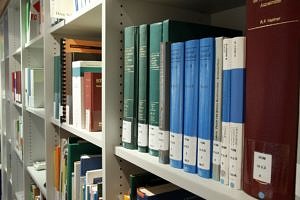Research
This section provides information on our research activities. One focus is on teaching and teacher education research (also relating to the acquisition of written language and social studies and science teaching). Further research topics in primary education are heterogeneity and inclusion, educational disadvantages and transitions.
In this research area, the demands of primary education for adaptive support measures and individual support in the learning process are substantiated. This involves, on the one hand, reviewing and further developing specific interventions in reading instruction and, on the other hand, measures suited to primary education with regard to individual diagnosis and support. The objectives of all the measures, and thus measures of effectiveness, are equally important for the development of the learners’ personality and performance in the learning environment. In addition, it is about the transfer of knowledge and the implementation of successful evaluation results in primary school teacher training and further education.
- Teaching and learning literacy and language acquisition (research area and research projects in detail – content only in German)
In addition to German and mathematics, social studies and science form the core subjects at primary school. The subject is characterised by a wide range of related fields, is designed to provide many different perspectives, and makes a decisive contribution to basic education. The research area focuses on how the requirements in teaching the subject matter can be met: on the one hand, it deals with subject-specific heterogeneous learning conditions and their adaptive consideration in teaching; on the other hand, it investigates effective teaching-learning processes in order to impart knowledge developed through dealing with subject areas at primary schools. Here, findings in the field of classroom research play as much of a role as those from the field of dealing with heterogeneity, but they are stated in terms of particular topics in the area of social studies and science. This research area is specifically concerned with quasi-experimental intervention studies (e. g. on cooperative learning), with innovative sub-areas such as economic education, computational thinking, technology, and health education.
- Teaching and learning social studies and science (research area and research projects in detail – content only in German)
This research area is concerned with the question of how the two transitions, from kindergarten and to secondary school, can be made as compatible as possible in primary school, with both transitions having the potential of becoming critical life events, especially the transition to secondary school with its high selection pressure and the effect on a learner’s opportunities in life. In terms of the transition approach, the two transitions are understood both as a challenge and an opportunity for children to develop, depending on their social and family background. Research in this area focuses on the children’s perspective and on the review of interventions aimed at strengthening emotional, personal, and social resources as resilience factors for actively managing transitions.
- Transitions in the primary school sector (research area and research projects in detail – content only in German)
This research area is concerned with the conditions for successful inclusion at primary school. In this context, inclusion is not reduced to the joint teaching of learners with and without disabilities, but is understood in a broad sense as a constructive approach to heterogeneity in all its facets (disability, social background, gender, migration, age, etc.). In addition to structural measures within the setting (e. g. mixed age groups, outdoor teaching), determinants in terms of school and class life, teaching, teachers, and their interaction are examined. Here, the focus is on the contribution of the above-mentioned conditions towards performance and personality development as well as on the social participation of the learners.
- Heterogeneity und inclusion (research area and research projects in detail – content only in German)
This research area is fundamentally concerned with questions of teaching research in primary education. Here, questions relating to the development of primary age children in the areas of achievement and personality are the focus. The structure and quality of primary school education is also taken into account. Building on this, the aim is to transfer these findings to primary school teacher training and to systematically research the effectiveness of these measures.
- Research on teaching and teacher education in the primary school sector (research area and research projects in detail – content only in German)
This research area is concerned with the empirical investigation of formal and non-formal educational settings as well as informal and formal learning, particularly against the background of (in)equality of opportunity and the contribution of individual settings to educational equity, participation, and empowerment. Primary schools are seen as a part of the educational landscape alongside learning within the family, by using media, as a result of child and youth work, sport, or music. It is examined how the consideration of informal learning processes in the classroom and networking with other educational settings can be used productively to promote successful learning at school. This is a challenge, especially when restructuring is taking place for primary schools to become all-day schools.
- Educational landscapes against the background of educational disadvantage (research area and research projects in detail – content only in German)



